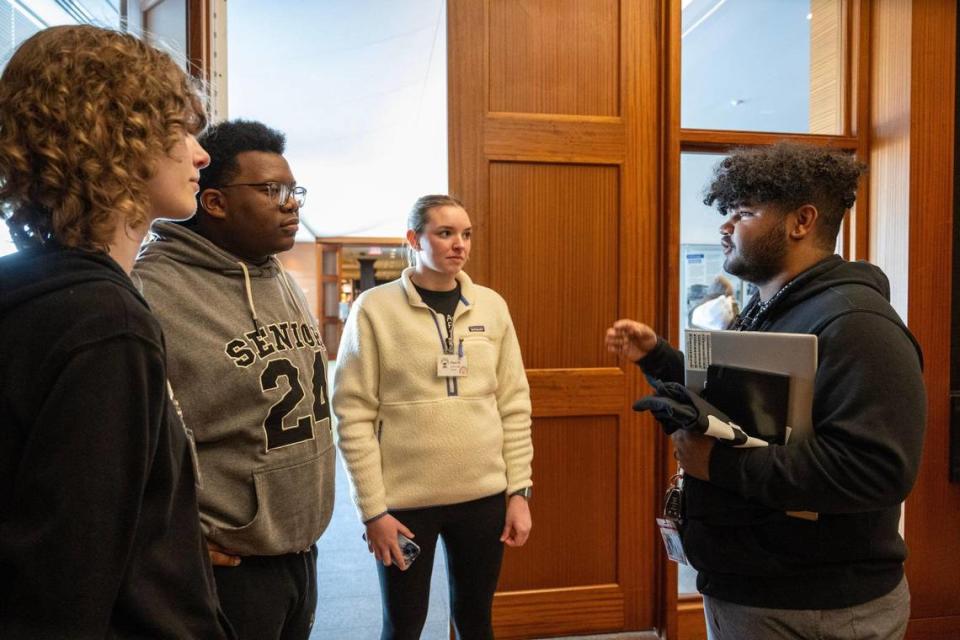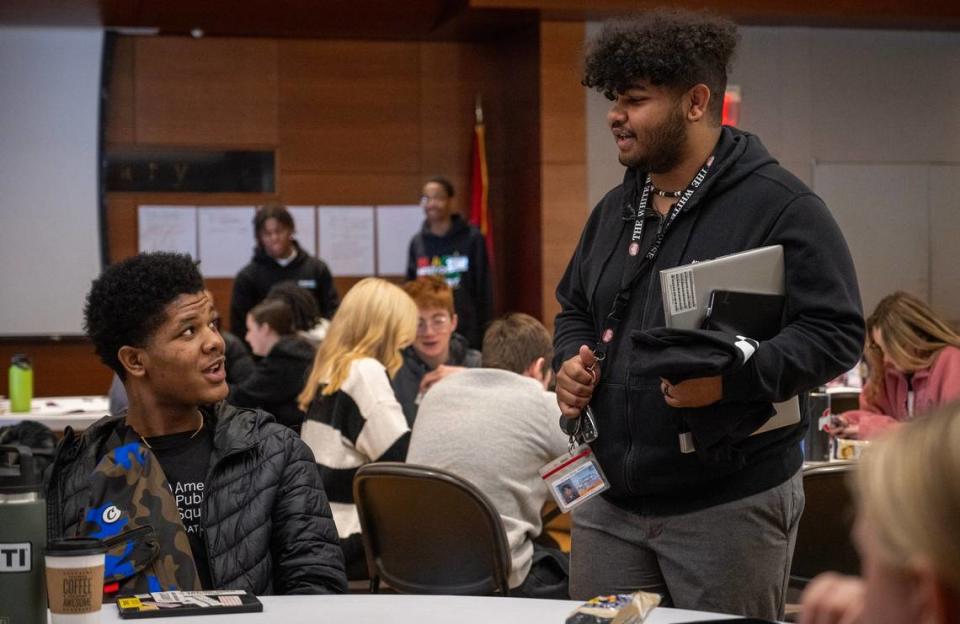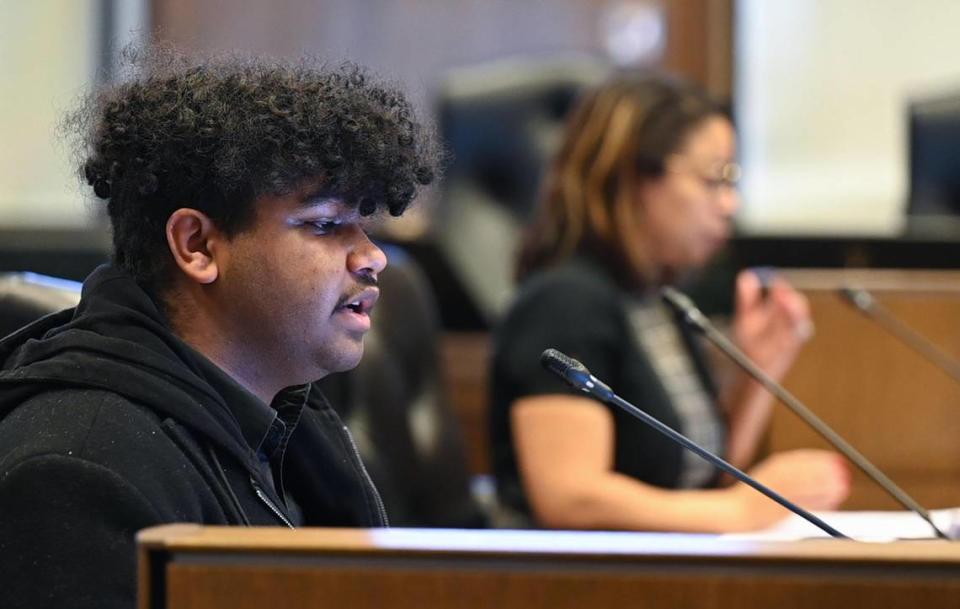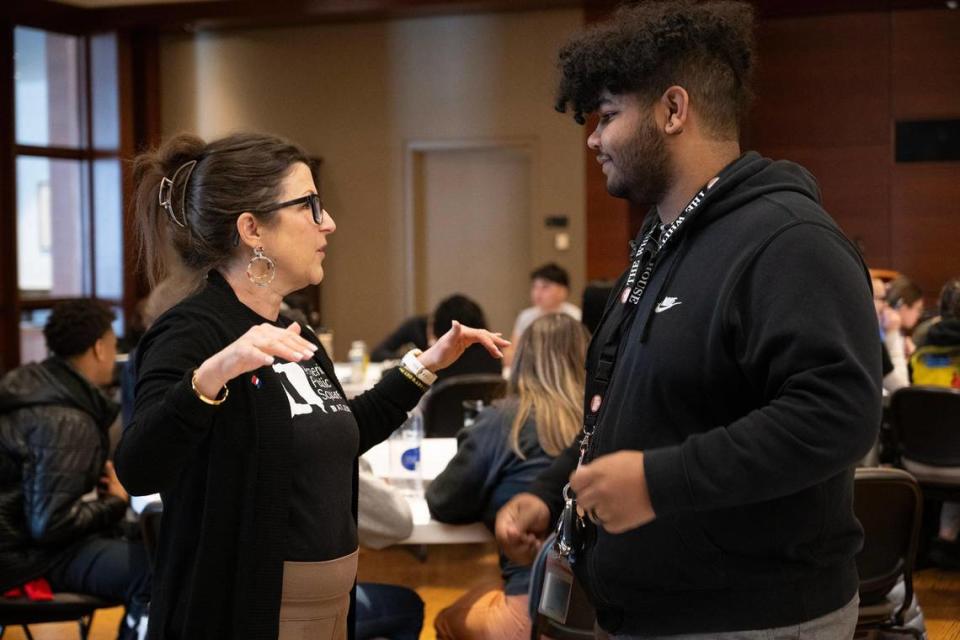This Kansas City teen wants to lower the voting age for local elections. Here’s why
Editor’s Note: This interview is part of the second season of Voices of Kansas City, a project created in collaboration with KKFI Community Radio and The Kansas City Star, to highlight the experiences of Kansas Citians making an impact on the community. Hear the interviews at 6 p.m. Wednesdays on KKFI 90.1 FM, or at KKFI.org. Do you know someone who should be featured in a future season of Voices of Kansas City? Tell us about them using this form.
Darvius Yearwood recently sat at the presenter’s table in front of the Kansas City Council in a chamber full of spectators who came to hear the young man make a case for creating a youth council that would have some say in the creation of policies designed to impact the lives of young residents in the city. The 17-year-old, composed and well prepared, rattled off data about the need for youth involvement in civic decision-making. It wasn’t the first time the 2023 National Youth Advocate of the Year had spoken to adult officials to support youth empowerment. Yearwood has been a youth advocate and activist since he was 12 years old.
The Kansas City Star invited Yearwood, who prefers to be called DJ, to the studios at KKFI Community Radio, as part of the second season of an innovative, community collaboration project, Voices of Kansas City. Mará Rose Williams, assistant manager for race and equity at The Star, interviewed DJ about his journey into youth advocacy and his future in community activism.
Their conversation, edited for length and clarity, is presented in a question and answer format to share DJ’s story most authentically in his own words.
The Star: So DJ, tell me about your activism. What is your activism?
DJ: Yeah. So I’m a youth activist or youth advocate. And so what I do is I advocate for my peers. I advocate for the interests of what I see my friends and my peers need. And that can range from support in schools to civic engagement to community building, things like that.
So, to be clear, how old are you, DJ?
I’m 17.
17 years old? And how long have you been doing this activist work?
I really got started in youth advocacy when I was 12 years old.
Tell me, what does youth advocacy or youth activism look like for a 12-year-old? What were you doing?
Yes. So I think the first thing to really note is the magnitude of issues that even 12-year-olds face. Right? And at that age is when I really started to realize how bad substance use and tobacco usage and vaping in particular was among my peers. And so that’s where my advocacy started, with addressing that issue.
Are you from Kansas City?
I’m from California. I’m from Bakersfield, California. I moved here when I was 10.
And where did you move to? Did you move to Kansas City proper?
Well, my family, part of my family, resides in Kansas City proper. I lived in Independence for my school.
So when you were 12 and you had this notion to advocate for youth as it relates to tobacco usage, where were you going to school?
I was going to William Chrisman High School.
Did something happen at school? Was there something that alerted you to this issue or did this just all of a sudden come to the mind of a 12-year-old?
Correction. I was going to Bingham (Middle School). Yeah, so what had happened was I had started getting engaged with the Jackson County Youth Court and I became a youth court defense attorney in the youth court system. It’s a diversion court. It’s a program to steer kids away from getting actual charges.
It’s still a real court setting except for, you know, you’re represented by your peers. With that, I realized, like, we would have like 80 cases a night strictly pertaining to tobacco and vape usage. That amount is crazy. Because it makes you realize how many people from your school or the surrounding schools are getting caught using it.
And that’s the key thing. These 80 cases are what we see. What about the ones not getting caught? And so they range from elementary school students on up.
Wow. That is a lot. So how often were you sitting in court and what was your role there?
Yeah, so originally I started off as a defense attorney and I worked my way up to lead defense attorney. We were in court about every other week, bimonthly or semimonthly. And what we were dealing with was, you know, the fact that our peers were doing things that were against the law. And then it was our job to provide peer-to-peer support as a defense attorney. But also to help figure out where we can help them adjust on their own.
And I’ve heard, you know, criticisms of whether or not that has impact coming from peer to peer. And it actually does, because we were able to connect on such a level like friends.

And that’s where you saw that youth and tobacco was a major problem for young people in your age range.
Correct. And the thing is you’re seeing people from your own school and, you know, who you may have went to school with in elementary school, being charged with things like this. And it could range also to violence and other things. But particularly this (tobacco) was overwhelming. It’s something that really grabs your attention.
So you begin to work for restrictions for flavored tobacco, and I think that’s really where your interests were. What happened with that? How far did you take it and what was the outcome?
Yeah, so it really got to the point where, you know, where I was seeing so many cases that it was like, what is causing this, right? And what caught my attention was, I believe she was a fifth-grader, or fifth- or fourth-grader, who had been charged with being in possession of a vape device. And I asked her, “Do you even know what this is?”
And she said, “No.” She thought she was just vaping flavored air. And, you know I believed her because I think that the tobacco industry itself has been very deceptive in its targeting of young people, particularly the vapes that she was hitting. It was the Cinnamon Toast Crunch.
Wait, vape? That’s not marketed for a 40-year-old. You know what I’m saying? And so when I realized that, I began working with the American Heart Association on a number of campaigns, particularly one here in Kansas City called the KC Flavors Campaign, to ban the sale of flavored tobacco and vape products.
And in that role, did you have cause to talk to legislators? And when did you realize, “Hey, I’m like an advocate or an activist?”
Yeah. So I think the first thing that made me really want to dive deeper was I was on this call and I was really hearing about, you know, how the tobacco industry has targeted Black people, how it has targeted women, how it targeted children, all these things. And one thing that I often repeat is that these things are so normal that we don’t even realize them until they’re told to us, like they’re shown in hard evidence to us.
And it really, like, made me, you know, have that moment where I’m like, “Wow.” And so I joined the KC Flavor’s team as a youth advocate. The first time that I was really proud of the work that I did in advocacy was when I met with the mayor’s (Quinton Lucas) chief of staff to discuss the mayor’s position on the topic.
And I was calling the council offices and trying to get them to support the effort. And so that was when I began to feel, you know, legitimate.
So this became a real passion for you.
Right. And I think the passion lies in the fact that I don’t think it’s right that with multiple things — not even just with tobacco — that industries can get away with so much in targeting young people. And there’s not much that people can do about it.
In other words, you want to see young people have a voice. You want to empower them to speak up and to have a voice for themselves.
Absolutely. Yes.

Talk to me a little bit about where that comes from. I saw somewhere a quote from Barack Obama that you like to reiterate. What is that?
Yes. So Barack Obama’s quote that really has driven my work is that “change will not wait for some other time or some other place. We are the ones we’re looking for. We are the change we seek.” And I think that really resonates with me because he wasn’t necessarily, in that speech, talking directly to anybody. But what we don’t often realize is that that is particularly important for people who often have their voices snuffed out or considered less than.
And so, you know, there may be demographics who feel like that quote really resonates with them. And I particularly feel that resonates with young people because we don’t have voting power. We don’t really. We’re not really taken seriously when we approach legislators. We aren’t really taken seriously based on all of our experiences and perspectives.
And so when we really want to do something, we have to show up in droves, right? We have to really put some power behind it to be able to, you know, accomplish anything really even small. And so I think that’s why that quote particularly really just has guided my work.
So we’re going to get to some of those things that you just mentioned in just a bit. But first, I want to ask you, as the mother of two young men myself, what do your parents think of the work you do? And did you get some of this passion and drive from them?
Yeah. So I grew up with a single mom who has four kids. She’s not into, you know, politics and things like that. So she tells me all the time she doesn’t know where I got it from. But I think that although it’s not necessarily the specific passion for advocacy that comes from my family, but it’s the looking out for other people.
Maybe getting things done, if I know that I can do them, I learned from my uncle. And I would say, you know, there’s definitely some traits in my advocacy that come from my family. Yeah.
Where do you fall with your siblings?
I’m the youngest boy and the second youngest.
So you did have some opportunity to look after a younger sibling. And watching over them and helping your mom out.
Yes, there is some of that. That definitely comes from home. Absolutely. Yes.
So as you were talking about some of the advocacy that you have done, you talked about what young people cannot do legally in terms of voting. You mentioned that they don’t have voting rights and that it takes droves of young people to show up and be very loud and to protest to get some movement, to get people to pay attention to what their needs are.
I understand that you’re working towards getting young people the right to vote for certain elections.
Yeah, I think that one thing that I have really used to guide the decisions that I make regarding what I advocate for and what I don’t is what would be appropriate if age wasn’t a factor. Right? And so would it be appropriate to say that X demographic, the entire demographic, is incompetent and they should not be able to vote because of X, Y, and Z?
They don’t have enough experience. They don’t have enough this, whatever. No, it wouldn’t be OK, right?
If we were to flip it, reverse it, and we were to say, you know, that old people at some age, they become too incompetent to vote, that would not be appropriate. It would be ageist, right? And so when we look at it for my age demographic, 16, 17 years old, who are working. They’re students at the same time, they drive cars, they’re community members, and they contribute and pay taxes, all of those things.

And then there are cynics who say, you know, they’re not mentally developed enough, they’re not ready for it and all the rest. I think that’s wholly inappropriate. Right? And especially to say to students that they shouldn’t be able to vote in school board elections, which directly impact their everyday lives. I think we as a whole have to come to realize, at some point, that all stakeholders matter.
And within schools, students are the greatest stakeholder, right? And so we have this population of 16 to 17 years old who are working and driving and paying taxes, and what I’ve decided to advocate for is lowering the voting age in nonpartisan, local and school board elections.
And would that be municipal elections as well as for mayor and council?
Yeah. So municipal elections and school board elections. One thing that’s particularly unique in Missouri is that we have nonpartisan local elections. And so this takes out any factor of, you know, creating partisanship at the local level with young people.
Does that happen someplace else? Are other cities doing that?
Yes. So most recently, which is very exciting, Newark, New Jersey, just lowered the voting age to 16 in their municipal elections. Takoma Park, Maryland, was the first city to do it. And they saw tremendous increases in civic engagement among their population and an increase in voter turnout over time.
And so there are a lot of benefits that come with it, too.
Such as?
So first, we are addressing the issue of taxation without representation. Sixteen and 17-year-olds no longer feel like they have no say in how their taxes are being spent by the people who take them from them. The second thing is that we’re creating this civic transition, right? So particularly in Takoma Park, we surveyed some of those students who began voting and they said that they feel more prepared to vote in state and federal elections because they had the opportunity to vote locally first.
To be able to evaluate those candidates, it takes a lot more work to evaluate candidates at the local level, to understand the issues at a local level. And so we’re providing the civic transition process between local elections to state and federal partisan elections.
Would you say that given the use of social media and the fact that we have information at our fingertips, young people have all of the tools they need to make an informed decision when it comes to their school board or their municipal election?
Yeah. That alludes to the fact that times are changing. Right? Information is easier to access. It’s easier to become informed. However, I don’t think at any point do students become unaware of what’s happening in their school district. Even if social media wasn’t a factor, students know how school board policies are impacting them.
They know which ones they like and which ones they do not like. They know how their school administrators are carrying out those policies. This is where we get into like the school to prison pipeline where how that’s exacerbated by specific administrators who may be enforcing school board policies disproportionately. And students know how these policies are impacted.
They just feel helpless, like they can’t do anything about it, which is something that we seek to change.
When you say we, who do you mean?
Yeah. So we’ve assembled the Vote16 group, which is youth advocates in Kansas City, Columbia and St. Louis so far. And we’ve got leadership teams across the state who are working in those areas.
And what role do you play there?
I’m the director of Vote16MO.
OK. So were you on the ground floor with the development of Vote16?
Yeah. So there is a Vote16USA, which is a nonpartisan national organization supporting the work of 16 efforts around the country. And then there’s Vote16MO, which is the Missouri branch of that. And I founded the Missouri branch of that. And we’ve been able to reach youth across the state and gain a lot of support.
Wonderful. So where does it stand now and what’s the goal?
Yeah. So the goal is to be able to ultimately get to a point where we can lower the voting age in all of Missouri’s nonpartisan, local, and school board elections. We anticipated that we would have a bill sponsor to introduce it into the House. And then we were going to go through committees.
There’s a lot of weird stuff happening right now. And, you know, we aren’t entirely aware of what’s happening with the politics end of it. However, we do know that we are diverting our resources back into Kansas City because Kansas City, as part of the Missouri Constitution, has the ability to lower the voting age for its own elections itself.
And so we are soon to be launching a Kansas City branch effort to lobby the City Council to pass a charter revision, which will then go to voters which will lower the voting age in Kansas City’s elections.
Very good. I know that recently you’ve had another campaign that you’re pushing in Kansas City: developing a youth council in Kansas City. And you have had some real success with that. Can you tell me a little bit more?
Yes. So actually the City Council passed an ordinance that I had been working on with Councilwoman (Melissa) Patterson Hazley. I had started working on this ordinance in June of 2021 before Councilwoman Patterson Hazley had been elected to the City Council. Now we got that ordinance finally passed, which creates the Kansas City Youth Commission.
This new commission has the ability to advise the City Council on matters directly relating to youth and lead the city’s youth outreach and engagement efforts. There is no other design in the nation that gives the commission this much power, this much ability. And so what this means is that Kansas City leaders are taking a real listen.

It means that they’re really listening to the fact that we’ve got issues. We keep walking around saying, young people this, young people that, we’ve got to set these curfews, we’ve got to do this. But there’s no real solutions being proposed. Just let’s limit how the young people can do this. Let’s limit that.
And so with this new board, this new commission will have the opportunity to enact real change and engage in real community impact, which is much different than any other designs that Kansas City has seen.
So basically what you’re saying is while you’re trying to make decisions for us young people, how about you ask us?
Right. Absolutely.
So as you go about the city, are you known by other young people? Do they know who you are? Have you made a name for yourself as a youth advocate? And how does that make you feel?
I think that people can really rely on me to help out in any area where youth advocates are involved.
And I think what it really makes me feel is proud that we’re able to build a coalition of people. That did not exist when I got started. Right? Youth advocacy was something that, you know, was really not respected. It really wasn’t a thing. The American Heart Association had one youth advocate, and it was me. I remember when we launched that campaign.
And so now there are teams of youth who are trained based off of the training that Vote16MO created. They’ve been trained in different parts of the state. They’ve been lobbying, lobbying at the state level, at the local level. They’ve been engaging in their school boards. And it feels really great to be able to say, you know, that the resources that were not there for me are now there, and I worked to help create them.
So what are you doing now? Are you going to college? Have you graduated from high school?
Yeah, I did. I graduated in December. I’m early. I’ll be going to college this fall. I’m still deciding where. I’m stuck between either going early or staying. Going to D.C. or staying here. I think what my next steps are, though, regardless, I will still be around. You know, where I can make the biggest impact in youth advocacy.
Do you think politics is in your future?
Absolutely. Since I was in like eighth grade, I dreamed about, you know, running for some type of office. What’s important to me is being young and running for office, because we don’t see it that much.
The youngest age to run for office in Kansas City or anywhere in Missouri is 25. You can run for anything up to Congress. And so I’m not sure what my first step will be. Obviously, I’ll have to cross that bridge when I get to it. But I do plan on running for office at a young age.
Well, as a young Black man in Kansas City, doing all that you have done for advocacy and activism, it would not surprise me if someday we have DJ as the president of the United States. Are you really thinking that far ahead? Is that something you’d like to do?
I think personally, I’m really obsessed with the executive branch itself. Like, just the way that it works. Serving in the executive branch in some capacity is my ultimate dream. I don’t know if that’s president. I don’t know what that is. But ultimately.
And your mom says what about that?
You know, she’s on her Facebook and she may post, “My son is going to be president,” or something like that. But, you know, I think she really has given me the opportunity to really decide and carve out where I’m headed, and where I want to go, and what I want to do.
What would you say has been your greatest accomplishment thus far?
My greatest accomplishment? I think I can’t pick just one. But where I felt like I was able to have the biggest reach was when I won the National Youth Advocate of the Year award last May. I was able to go out to Washington, D.C., and, you know, celebrate the award, but with other youth advocates, national youth advocates.
When I was named the National Youth Advocate it was something that really recognized the fact that I’ve been working really hard. But also, I’ve been able to expand my reach. For example, I’ve been able to go to Panama City to speak at the COP 10 (Conference of the Parties) conference and I was able to travel to 25 different states last year to do youth advocacy training.
And so it’s just been really exciting, you know, following that.

Well, thank you so much for being here with us today, DJ. I mean, I’m super proud of you.
Thank you.
And I wish you all the luck in the world. I can’t wait to see the fruits of your labor, to see what comes next for you and for Kansas City, and especially for Kansas City’s youth.
Thank you.

